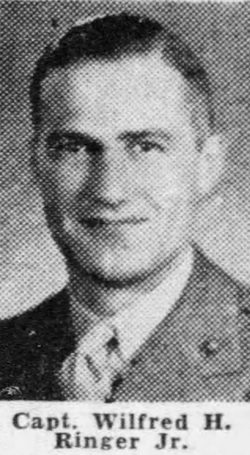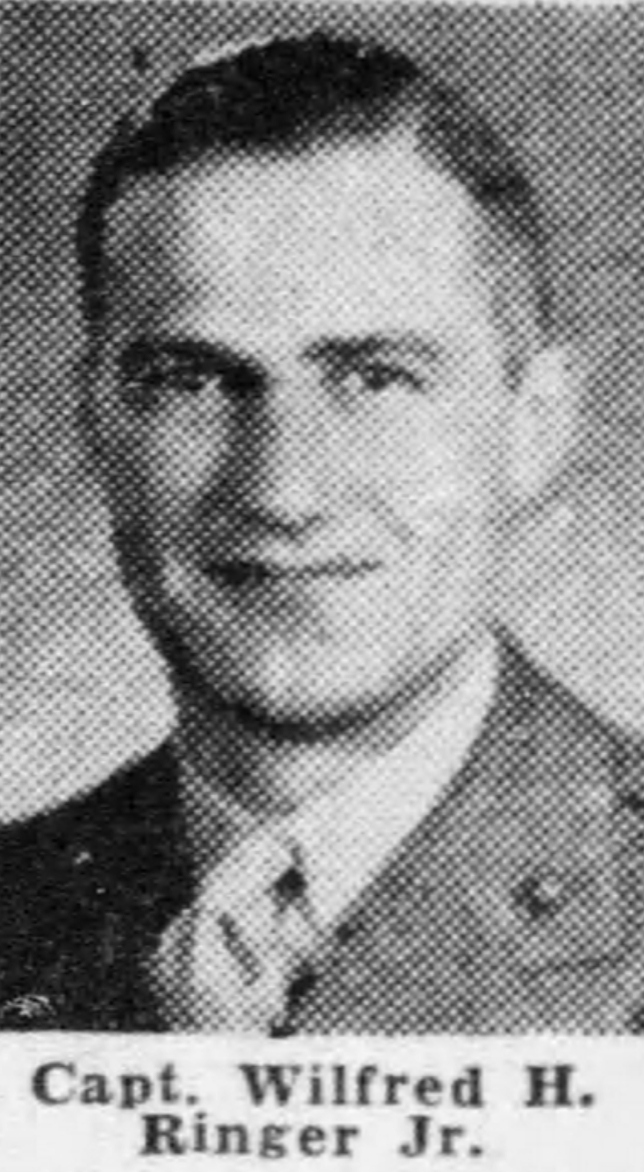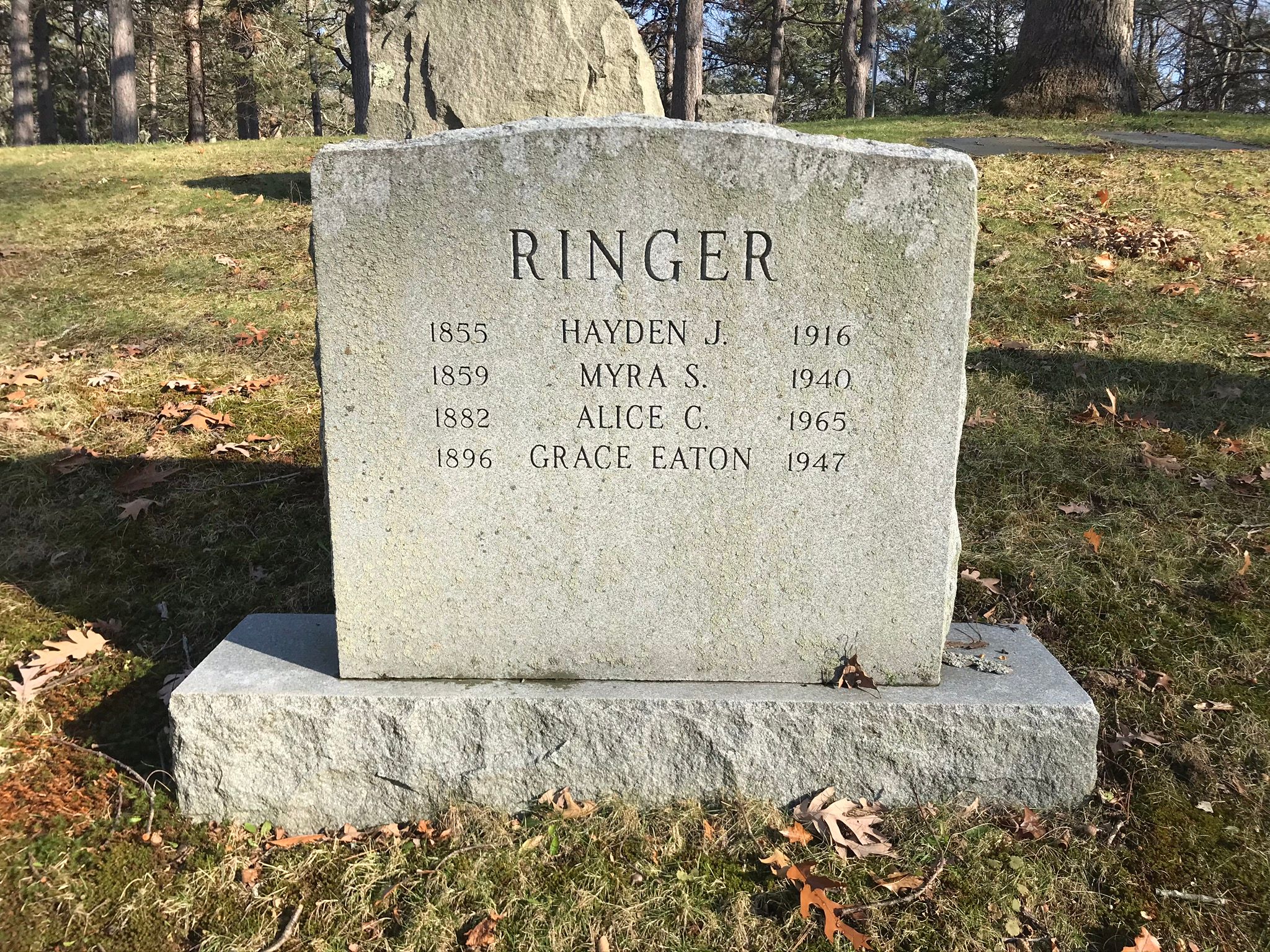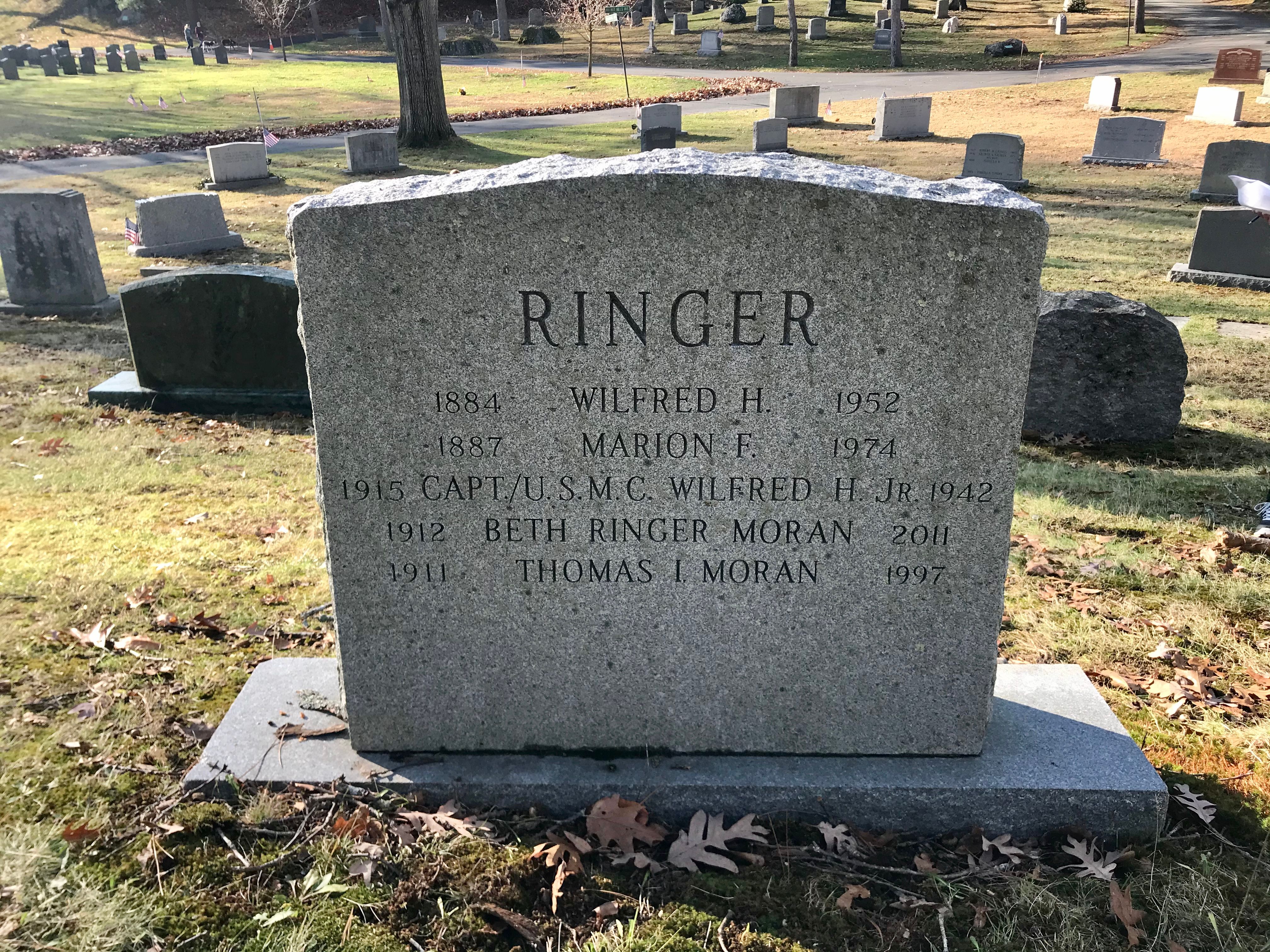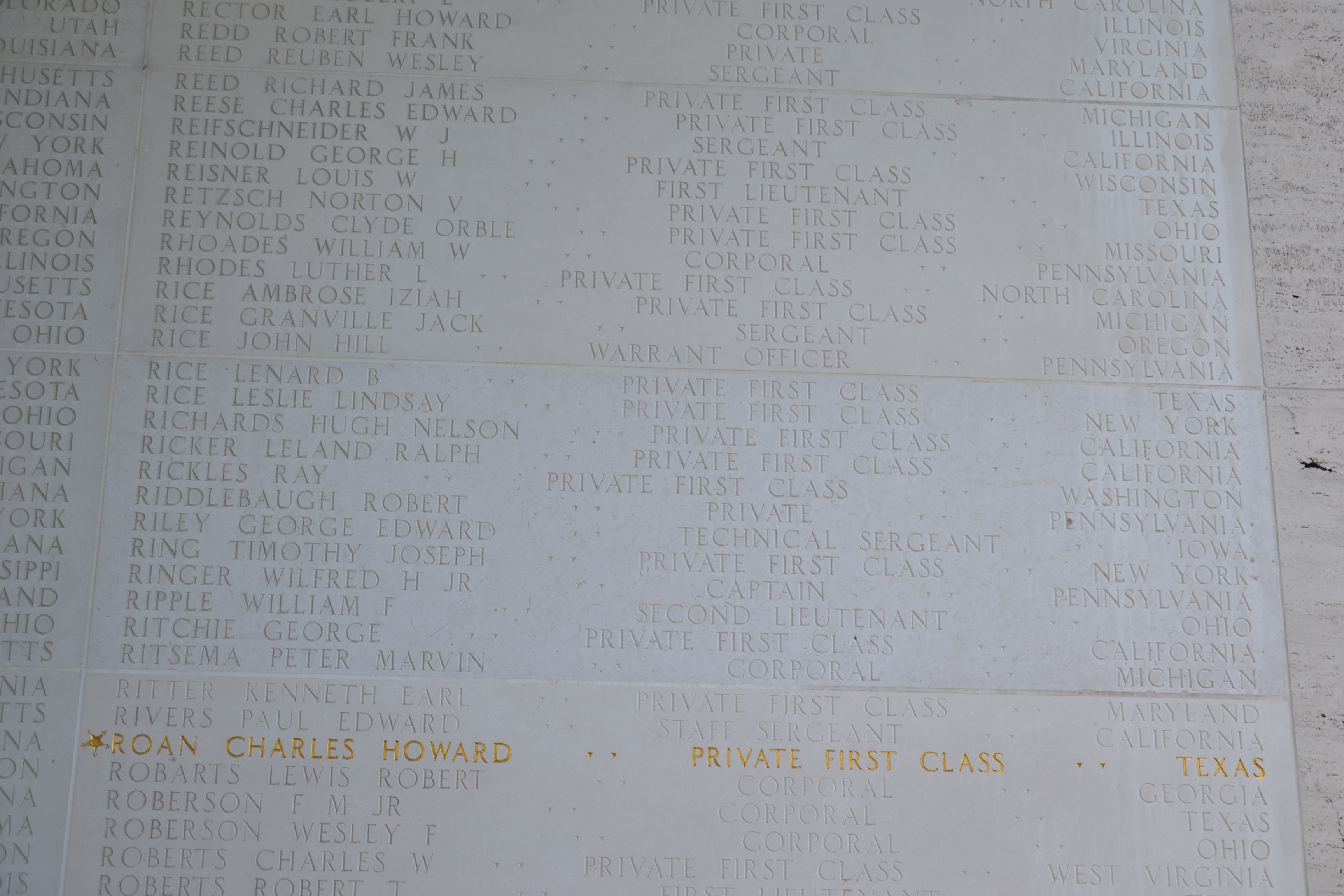The 1930 US Census shows the family living in Glouchester, Essex County, Massachusetts. The following family members are recorded as living in the home at that time:
Head Wilfred H Ringer M 45 Massachusetts
Wife Marion F Ringer F 42 Massachusetts
Daug Beth M Ringer F 18 Michigan
Son Wilfred H Ringer Jr. M 14 New York
Son Hayden N Ringer M 6 Massachusetts
While still a sophomore at Tufts, Bill decided to join the Marine Corps Reserve. His career began on June 4, 1935, at the Eastern Platoon Leader's Class (PLC) at Quantico, Virginia. Bill chose to not go active duty Marines and instead opted to go the slower career track of the Marine Reserves. His performance in the PLC class was noteworthy as he finished first in his class in 1938.
Most of Bill's first four-year enlistment was spent on inactive duty before his promotion to second lieutenant in 1939. He reported for duty at the General Service Unit at the Philadelphia Navy Yard and carried on a romance with Miss Ruth Warren. The 1940 US Census shows Bill as living in a boarding house in Wilkinsburg, Allegheny County Pennsylvania.
In February 1941, Bill was called up for active service. The casual Marine officer was to be transformed into a tough and adept leader. He went through training at Indiantown Gap, Pennsylvania and became qualified to lead a platoon. After that courses completion, Bill was given a section of Company M, Third Battalion, Fifth Marines. Later that same year, and was deemed responsible enough to lead the company albeit only temporarily.
Shortly before the attack on Pearl Harbor, Ringer was transferred to the 5th Marine Regiment's Headquarters & Service Company as the Assistant Operations Officer and was promoted to First Lieutenant on February 28, 1942. While training in the spring and summer of 1942, he showed an aptitude for intelligence work and earned a promotion to Captain. The 5th Marines were assigned to the First Marine Division which soon departed to Wellington, New Zealand, for further training before they took the war to the Japanese. But not long after their arrival, the training time was greatly reduced and the Regiment was prepped for an amphibious landing at a place in the Solomon Islands named Guadalcanal. The intelligence information was sparse and, as Bill and his fellow intelligence men would learn, unreliable.
The landing on Guadalcanal went unopposed. The Japanese waited in the jungle for the coming battle with the Marines. The Intelligence Section set about gathering and analyzing information they gleaned from the area. On August 12th, a Marine patrol from the 3rd Battalion, 5th Marine Regiment, captured a Japanese soldier named Sakado, found in their area. The Marines learned that the Japanese west of the Matanikau River were a disorganized and demoralized group, short on food and in poor health. They could, Sakado thought, be induced to surrender given the proper conditions.
The commander of the Intelligence Section, Colonel Frank Bryan Goettge, had been annoyed by the rush job that intelligence had been forced into in New Zealand and the now apparent shortcomings in maps and other data were becoming more evident. Sakado was a godsend. Col. Goettge sent First Sergeant Steven Custer to organize a patrol, which Goettge himself would head. They would take an interpreter, a doctor, a good portion of the intelligence section and some riflemen for support, and boat across to a secluded beach where a white flag had reportedly been seen. They would convince the Japanese there to surrender and work their way back to Headquarters the next day, with Goettge presumably at the head of a cluster of happily surrendered Japanese.
Bill watched as more and more of his men were picked to go on the patrol, each one a specialist replacing a fighter. Bill himself would come along as second in command Lieutenant Cory would act as interpreter, and even the job of prisoner bodyguard – an easy task for the most junior private – was given to a trained intelligence man, Platoon Sergeant Denzil Ray Caltrider. The reorganization took hours, causing Custer's original timetable to be thrown off – and a certain amount of "resentment and foreboding" on Bill's part. Worried, Ringer found Captain Lyman Spurlock of L/3/5 and asked if he could send a relief patrol if something went wrong. Spurlock demurred, saying "It would be difficult at night."
The patrol, consisting of 25 men plus Sakado (who was led by a rope around his neck by Platoon Sergeant Caltrider) set out from the camp at Kukum at about 1800 hours – a twelve hour delay caused by the numerous personnel changes. The men were traveling light, carrying enough food for one day, a canteen, a poncho, and only light weapons (Custer had wanted heavy machine-guns but Col. Goettge denied this request).
Due to tidal issues, the delay caused another problem – it was now too late to risk heading for the original landing site. Ignoring the warnings of Lieutenant Colonel Bill Whaling and the cries of Sakado, who begged them not to land there, the boat turned for shore and landed about 200 yards west of the Matanikau. The boat ran up on a sandbar, forcing the Marines to jump over the gun-whales and rock it free, creating quite a racket. They waded in to shore and, taking cover behind a line of banyan trees, held a quick council of war. All the noise they had made and now this pause gave the Japanese soldiers of the 2nd Platoon, 11th CU Security Force under Lt. Soichi Shindo, plenty of time to pick their targets. As Col. Goettge led an advance party into the treeline, two shots rang out. Col. Goettge fell dead with a shot to the head. The seriously wounded 1stSgt Custer dropped beside him. Two Marines who crawled forward to check on the men recovered Goettge's insignia and wristwatch. Command passed to Captain Wilfred Ringer. He dragged the mortally wounded 1st Sgt. Custer to the perimeter – there was no cover on the beach – and yelled an order to call back the boat. One of the corporals ran into the surf and fired wildly in the air at the still visible boat, but to no avail. The Marines were trapped. Soon, Bill himself was wounded. Lieutenant Cory was down with an agonizing stomach wound. Regimental Surgeon Dr. Malcolm Pratt,USN, was shot while tending to a wounded man. Every few minutes, a Marine was hit. As more Marines dropped, killed or wounded, Bill called for Corporal William Bainbridge and ordered him to head back along the beach to the American perimeter to get help. Bainbridge set off at a run and disappeared into the darkness never to be seen alive again (Cpl. Bainbridge's bullet riddeled body would be found by a Marine Patrol a week later, several hundred yards from where the Goettge Patrol was massacred. He was buried were he fell).
The survivors formed a defensive perimeter on the beach, and over the course of the night and following morning the Marines were gradually picked off by the Japanese defenders. By dawn, the patrol had been wiped out aside from three survivors who managed to swim back to friendly lines one at a time. They reported seeing Japanese swords "flashing in the sun" as they fell upon the wounded and dead.
The bodies of the Goettge Patrol were never recovered. There were accounts of knowing where they were and that they had been thrown into fighting trenches and covered up. There were at least three reports over the following weeks after the fight that the bodies were partially buried in the sand with limbs sticking out of the makeshift graves. One report, made by a Marine years later stated he was on patrol at the scene of the slaughter and personally saw the mutilated bodies of Goettge's patrol to include decapitated torsos and boots with limbs still attached. But no bodies were ever recovered.
Bill's remains as well as the remains of the rest of the men are lost to this day. Several recovery attempts over the past 65 years have found nothing and it is suspected now that building in the area and the change of the shoreline will result in the patrol's remains never being recovered.
The Fitchburg (Massachusetts) Sentinel newspaper reported in their September 18, 1942 edition the following information:
"Capt. Wilfred H. Ringer, Jr., 27, a former resident, was reported missing in the official Navy casualty list released yesterday. Capt. Ringer is the husband of Mrs. Ruth (Warren) Ringer and son, Headmaster Wilfred H. Ringer of the Brookline High School and Mrs. Ringer. Mr. Ringer was principal of the Leominster (Massachusetts) High School immediately after the first World war. Capt. Ringer was in the U.S. Marine Reserve. He was graduated from Tufts college and was called up for active duty in February, 1941. He was stationed at the Philadelphia Navy Yard and later transferred to the South Pacific."
At the time of his death, Bill's wife, Ruth Warren Ringer, was living at 1511 Wood Ave, Colorado Springs, Colorado. Bill had married Ruth very shortly before he deployed overseas. It is doubtful that his parents ever met his wife. Bill and Ruth had no children and she would later marry an Army officer. Contact with Bill's family eventually ceased and they lost contact.
Captain Wilfred Harvey Ringer, Jr., Sn #O-006084, earned the following badges/decorations for his service in the United State Marine Corps and during World War II:
- Combat Action Ribbon
- Purple Heart Medal
- Navy/Marine Corps Presidental Unit Citation
- American Defense Service Medal
- Asiatic-Pacific Theater of Operations Campaign Medal with one bronze battle/campaign star
- World War II Victory Medal
- Navy/Marine Corps Presidential Unit Citation Ribbon
- Marine Corps Rifle Marksmanship Badge
**NOTE** - A small portion of this bio is based on information from the website missingmarines.com. They have done a fantastic job of researching approximately 3000 US Marines whose bodies were lost in the war. This writer wholeheartedly recommends their site for researchers or families of the missing. - Rick Lawrence, MSgt., USMC/USAFR {RET})
The 1930 US Census shows the family living in Glouchester, Essex County, Massachusetts. The following family members are recorded as living in the home at that time:
Head Wilfred H Ringer M 45 Massachusetts
Wife Marion F Ringer F 42 Massachusetts
Daug Beth M Ringer F 18 Michigan
Son Wilfred H Ringer Jr. M 14 New York
Son Hayden N Ringer M 6 Massachusetts
While still a sophomore at Tufts, Bill decided to join the Marine Corps Reserve. His career began on June 4, 1935, at the Eastern Platoon Leader's Class (PLC) at Quantico, Virginia. Bill chose to not go active duty Marines and instead opted to go the slower career track of the Marine Reserves. His performance in the PLC class was noteworthy as he finished first in his class in 1938.
Most of Bill's first four-year enlistment was spent on inactive duty before his promotion to second lieutenant in 1939. He reported for duty at the General Service Unit at the Philadelphia Navy Yard and carried on a romance with Miss Ruth Warren. The 1940 US Census shows Bill as living in a boarding house in Wilkinsburg, Allegheny County Pennsylvania.
In February 1941, Bill was called up for active service. The casual Marine officer was to be transformed into a tough and adept leader. He went through training at Indiantown Gap, Pennsylvania and became qualified to lead a platoon. After that courses completion, Bill was given a section of Company M, Third Battalion, Fifth Marines. Later that same year, and was deemed responsible enough to lead the company albeit only temporarily.
Shortly before the attack on Pearl Harbor, Ringer was transferred to the 5th Marine Regiment's Headquarters & Service Company as the Assistant Operations Officer and was promoted to First Lieutenant on February 28, 1942. While training in the spring and summer of 1942, he showed an aptitude for intelligence work and earned a promotion to Captain. The 5th Marines were assigned to the First Marine Division which soon departed to Wellington, New Zealand, for further training before they took the war to the Japanese. But not long after their arrival, the training time was greatly reduced and the Regiment was prepped for an amphibious landing at a place in the Solomon Islands named Guadalcanal. The intelligence information was sparse and, as Bill and his fellow intelligence men would learn, unreliable.
The landing on Guadalcanal went unopposed. The Japanese waited in the jungle for the coming battle with the Marines. The Intelligence Section set about gathering and analyzing information they gleaned from the area. On August 12th, a Marine patrol from the 3rd Battalion, 5th Marine Regiment, captured a Japanese soldier named Sakado, found in their area. The Marines learned that the Japanese west of the Matanikau River were a disorganized and demoralized group, short on food and in poor health. They could, Sakado thought, be induced to surrender given the proper conditions.
The commander of the Intelligence Section, Colonel Frank Bryan Goettge, had been annoyed by the rush job that intelligence had been forced into in New Zealand and the now apparent shortcomings in maps and other data were becoming more evident. Sakado was a godsend. Col. Goettge sent First Sergeant Steven Custer to organize a patrol, which Goettge himself would head. They would take an interpreter, a doctor, a good portion of the intelligence section and some riflemen for support, and boat across to a secluded beach where a white flag had reportedly been seen. They would convince the Japanese there to surrender and work their way back to Headquarters the next day, with Goettge presumably at the head of a cluster of happily surrendered Japanese.
Bill watched as more and more of his men were picked to go on the patrol, each one a specialist replacing a fighter. Bill himself would come along as second in command Lieutenant Cory would act as interpreter, and even the job of prisoner bodyguard – an easy task for the most junior private – was given to a trained intelligence man, Platoon Sergeant Denzil Ray Caltrider. The reorganization took hours, causing Custer's original timetable to be thrown off – and a certain amount of "resentment and foreboding" on Bill's part. Worried, Ringer found Captain Lyman Spurlock of L/3/5 and asked if he could send a relief patrol if something went wrong. Spurlock demurred, saying "It would be difficult at night."
The patrol, consisting of 25 men plus Sakado (who was led by a rope around his neck by Platoon Sergeant Caltrider) set out from the camp at Kukum at about 1800 hours – a twelve hour delay caused by the numerous personnel changes. The men were traveling light, carrying enough food for one day, a canteen, a poncho, and only light weapons (Custer had wanted heavy machine-guns but Col. Goettge denied this request).
Due to tidal issues, the delay caused another problem – it was now too late to risk heading for the original landing site. Ignoring the warnings of Lieutenant Colonel Bill Whaling and the cries of Sakado, who begged them not to land there, the boat turned for shore and landed about 200 yards west of the Matanikau. The boat ran up on a sandbar, forcing the Marines to jump over the gun-whales and rock it free, creating quite a racket. They waded in to shore and, taking cover behind a line of banyan trees, held a quick council of war. All the noise they had made and now this pause gave the Japanese soldiers of the 2nd Platoon, 11th CU Security Force under Lt. Soichi Shindo, plenty of time to pick their targets. As Col. Goettge led an advance party into the treeline, two shots rang out. Col. Goettge fell dead with a shot to the head. The seriously wounded 1stSgt Custer dropped beside him. Two Marines who crawled forward to check on the men recovered Goettge's insignia and wristwatch. Command passed to Captain Wilfred Ringer. He dragged the mortally wounded 1st Sgt. Custer to the perimeter – there was no cover on the beach – and yelled an order to call back the boat. One of the corporals ran into the surf and fired wildly in the air at the still visible boat, but to no avail. The Marines were trapped. Soon, Bill himself was wounded. Lieutenant Cory was down with an agonizing stomach wound. Regimental Surgeon Dr. Malcolm Pratt,USN, was shot while tending to a wounded man. Every few minutes, a Marine was hit. As more Marines dropped, killed or wounded, Bill called for Corporal William Bainbridge and ordered him to head back along the beach to the American perimeter to get help. Bainbridge set off at a run and disappeared into the darkness never to be seen alive again (Cpl. Bainbridge's bullet riddeled body would be found by a Marine Patrol a week later, several hundred yards from where the Goettge Patrol was massacred. He was buried were he fell).
The survivors formed a defensive perimeter on the beach, and over the course of the night and following morning the Marines were gradually picked off by the Japanese defenders. By dawn, the patrol had been wiped out aside from three survivors who managed to swim back to friendly lines one at a time. They reported seeing Japanese swords "flashing in the sun" as they fell upon the wounded and dead.
The bodies of the Goettge Patrol were never recovered. There were accounts of knowing where they were and that they had been thrown into fighting trenches and covered up. There were at least three reports over the following weeks after the fight that the bodies were partially buried in the sand with limbs sticking out of the makeshift graves. One report, made by a Marine years later stated he was on patrol at the scene of the slaughter and personally saw the mutilated bodies of Goettge's patrol to include decapitated torsos and boots with limbs still attached. But no bodies were ever recovered.
Bill's remains as well as the remains of the rest of the men are lost to this day. Several recovery attempts over the past 65 years have found nothing and it is suspected now that building in the area and the change of the shoreline will result in the patrol's remains never being recovered.
The Fitchburg (Massachusetts) Sentinel newspaper reported in their September 18, 1942 edition the following information:
"Capt. Wilfred H. Ringer, Jr., 27, a former resident, was reported missing in the official Navy casualty list released yesterday. Capt. Ringer is the husband of Mrs. Ruth (Warren) Ringer and son, Headmaster Wilfred H. Ringer of the Brookline High School and Mrs. Ringer. Mr. Ringer was principal of the Leominster (Massachusetts) High School immediately after the first World war. Capt. Ringer was in the U.S. Marine Reserve. He was graduated from Tufts college and was called up for active duty in February, 1941. He was stationed at the Philadelphia Navy Yard and later transferred to the South Pacific."
At the time of his death, Bill's wife, Ruth Warren Ringer, was living at 1511 Wood Ave, Colorado Springs, Colorado. Bill had married Ruth very shortly before he deployed overseas. It is doubtful that his parents ever met his wife. Bill and Ruth had no children and she would later marry an Army officer. Contact with Bill's family eventually ceased and they lost contact.
Captain Wilfred Harvey Ringer, Jr., Sn #O-006084, earned the following badges/decorations for his service in the United State Marine Corps and during World War II:
- Combat Action Ribbon
- Purple Heart Medal
- Navy/Marine Corps Presidental Unit Citation
- American Defense Service Medal
- Asiatic-Pacific Theater of Operations Campaign Medal with one bronze battle/campaign star
- World War II Victory Medal
- Navy/Marine Corps Presidential Unit Citation Ribbon
- Marine Corps Rifle Marksmanship Badge
**NOTE** - A small portion of this bio is based on information from the website missingmarines.com. They have done a fantastic job of researching approximately 3000 US Marines whose bodies were lost in the war. This writer wholeheartedly recommends their site for researchers or families of the missing. - Rick Lawrence, MSgt., USMC/USAFR {RET})
Family Members
Other Records
Sponsored by Ancestry
Advertisement
Explore more
Sponsored by Ancestry
Advertisement
